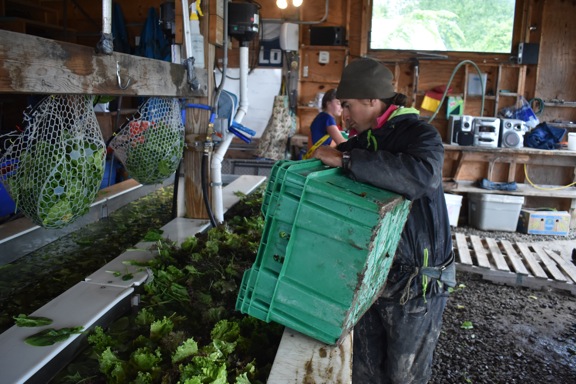SAVOR THE SEASON: Growing customers with CSA

Ian Ater, the co-owner and operator of Fledging Crow Vegetables in Keeseville, dumps a crate of lettuce into a sink to be washed before it goes to market. (News photo — Griffin Kelly)
KEESEVILLE – For the past 10 years, Ian Ater and Lucas Christenson have grown an assortment of crops on their farm, Fledging Crow Vegetables. The goal is to grow and sell local, organic produce to people and businesses in North Country communities.
To maintain this goal, the two quickly got involved with CSA, which stands for community-supported agriculture. People invest in a local farm and reap the benefits of a good harvest. Feldging Crow’s website explains it well.
“CSA is a model in which customers pay upfront for a season’s worth of produce. Receiving the money in the early part of the season allows us, your farmers, to make the necessary investments in seeds, infrastructure, equipment and field prep for the upcoming season. It also allows you, our shareholders, to take on a small share of the weather-related and pest-related risk of farming by offering your support to us before we’ve put seedlings in the ground. In return, our customers get a year’s supply of the freshest and most delicious vegetables at a great value.”
Ater said the amount of people who invest sometimes fluctuates, and they tend to pick up more customers midway through the selling season.
“Our community-supported agriculture has gone from 30 dedicated people back in 2009 to a couple of years ago we were up to almost 550 members,” he said. “This year we’re at about 300 members.”
The farm handles its CSA sales in two manners: market share and full share.
With market shares, people invest anywhere between $290 and $375 and receive a $400 Crow Card, which is kind of like a credit card for vegetables from the farm. With the Crow Card, people can visit any of the farmers markets and pick whatever vegetables they’d like, and the balance is removed from the card. With the full share, which is an investment between $750 and $900, there is no Crow Card, and you basically get to take whatever vegetables you want when you want.
Fledging Crow has stands at farmers markets in Keeseville, Keene, Lake Placid, Saranac Lake and Plattsburgh.
The farm used to prepackage boxes for CSA with every customer’s individual choices for that week, but that just became too inefficient, and Ater realized it was easier just to have customers bring their own containers and stock up on whatever they’d like.
Fledging Crow grows about 40 different crops throughout the year, including lettuce, zucchini and bok choy. However, Ater has noticed some favorites among the vegetables.
“I always joke with people because in a perfect world every CSA would just have spinach, tomatoes, sweet corn and strawberries,” he said.
Ater admitted that at times, operating a farm on CSA isn’t the most profitable. In fact, he wouldn’t really recommend it to people looking to start a farm.
“In 2018, I would not emphasize starting farmers – young or old – to start a CSA program,” he said. “It’s a very, very difficult way to make a living. We haven’t found that there’s a ton of profit in the CSA program, which is, you know, a little disappointing for people to hear, but we’ve tried to diversify the way that we sell products so that we can keep the CSA.”
Instead of relying strictly on CSA revenue, Fledging Crow also grows wholesale cash crops.
“Right now Fledging Crow does about 10 acres of carrots, which we wholesale on a larger basis,” Ater said. “We do a ton of spinach. We do a ton of shallots and onions and beets, which really helps cash flow.
“There are some other wonderful farms in the area that have gotten out of CSA because the logistics of organizing it are very difficult,” he continued. “I’m not going to say it’s a nightmare, but it’s very difficult. Yesterday we had three trucks on the road, and I was employing seven people just to distribute our product. Year in and year out, one might say that it’s not sustainable, and so what we’re trying to do is find a magical number of CSA members in which we’re fulfilling the demand that’s there for our product but also trying to make a living for ourselves, too.”
Ater could just switch over to a strictly wholesale farm if he wanted to. He wouldn’t need to hire as many workers, he could focus on only a few vegetables instead of nearly 30, and distributors would come to him for pickups. But that’s not the point of it all.
“It really is rewarding when someone comes up and is so enthusiastic about your food,” he said. “That’s the paycheck.”
Recently, two women stopped by the farm to pick up their vegetables. They have been CSA members since the very beginning, according to Ater. Before it had greenhouses, before it had a wash barn, before there was a massive walk-in cooler, these ladies have been committed members to the success of Fledging Crow.
“We feel very dedicated to these people, and this is the real reason why we stayed in the CSA,” Ater said. “Members from Keene Valley to Lake Placid, Saranac Lake, Plattsburgh have just been awesome.”


